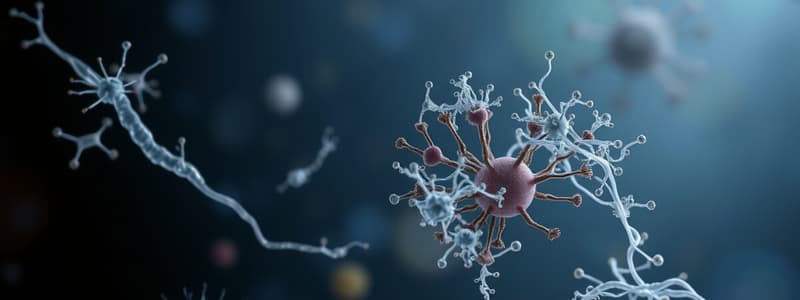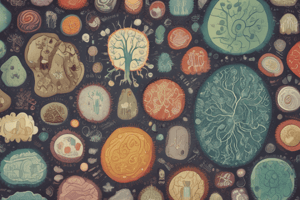Podcast
Questions and Answers
Which kingdom is referred to as Fungi Imperfecti?
Which kingdom is referred to as Fungi Imperfecti?
- Protista
- Zygomycota
- Ascomycota
- Deuteromycota (correct)
What type of reproduction can Zygomycota undergo?
What type of reproduction can Zygomycota undergo?
- Neither asexual nor sexual reproduction
- Only asexual reproduction
- Both asexual and sexual reproduction (correct)
- Only sexual reproduction
Which of the following statements accurately describes the cell structure of Eubacteria?
Which of the following statements accurately describes the cell structure of Eubacteria?
- They possess a prokaryotic cell structure. (correct)
- They lack any form of cellular structure.
- They have a eukaryotic cell structure.
- They are a type of virus.
What does the term hyphae refer to in fungi?
What does the term hyphae refer to in fungi?
What was one significant contribution of Louis Pasteur to microbiology?
What was one significant contribution of Louis Pasteur to microbiology?
Which of the following classifications is no longer valid in the context of fungi?
Which of the following classifications is no longer valid in the context of fungi?
Which branch of microbiology specifically studies protozoans and helminths?
Which branch of microbiology specifically studies protozoans and helminths?
What defines fungi as heterotrophs?
What defines fungi as heterotrophs?
What is the study of fungi known as?
What is the study of fungi known as?
In the classification of microbes, eukaryotes are divided into how many kingdoms?
In the classification of microbes, eukaryotes are divided into how many kingdoms?
What is the primary focus of immunology within microbiology?
What is the primary focus of immunology within microbiology?
How do most fungi contribute to their ecosystem?
How do most fungi contribute to their ecosystem?
Which fungal group produces sexual spores within an ascus?
Which fungal group produces sexual spores within an ascus?
Which of the following diseases is specifically linked to protozoans studied in parasitology?
Which of the following diseases is specifically linked to protozoans studied in parasitology?
Which scientific advancement is Robert Koch best known for in relation to disease causation?
Which scientific advancement is Robert Koch best known for in relation to disease causation?
What role did Pasteurization play in microbiological studies?
What role did Pasteurization play in microbiological studies?
Which process primarily exemplifies the use of microorganisms in recycling nitrogen within ecosystems?
Which process primarily exemplifies the use of microorganisms in recycling nitrogen within ecosystems?
What type of respiration occurs during the fermentation process?
What type of respiration occurs during the fermentation process?
What is the main carbohydrate source used in the fermentation of beer?
What is the main carbohydrate source used in the fermentation of beer?
Which of the following food products is NOT produced through fermentation?
Which of the following food products is NOT produced through fermentation?
What role do microorganisms play in water treatment processes?
What role do microorganisms play in water treatment processes?
Which of the following statements regarding decomposition by microorganisms is true?
Which of the following statements regarding decomposition by microorganisms is true?
How do microorganisms contribute to food production aside from fermentation?
How do microorganisms contribute to food production aside from fermentation?
Which microorganism is most commonly used in the production of beer?
Which microorganism is most commonly used in the production of beer?
What type of infections is P. carinii primarily associated with?
What type of infections is P. carinii primarily associated with?
Which of the following best describes basidiospores?
Which of the following best describes basidiospores?
Cutaneous mycoses caused by dermatophytes are primarily characterized by which of the following features?
Cutaneous mycoses caused by dermatophytes are primarily characterized by which of the following features?
What is the function of the trophozoite stage in protozoan life cycles?
What is the function of the trophozoite stage in protozoan life cycles?
Which of the following statements about the Basidiomycota is true?
Which of the following statements about the Basidiomycota is true?
What is the distinctive feature of the macro- and micronucleus in protozoa?
What is the distinctive feature of the macro- and micronucleus in protozoa?
Which fungal disease is caused by Sporothrix schenckii?
Which fungal disease is caused by Sporothrix schenckii?
Which characteristic is NOT typical of the kingdom Protista?
Which characteristic is NOT typical of the kingdom Protista?
Which of the following characteristics is NOT associated with protozoans?
Which of the following characteristics is NOT associated with protozoans?
Which group of protozoans includes organisms that are primarily responsible for human diseases?
Which group of protozoans includes organisms that are primarily responsible for human diseases?
Which of the following protozoan characteristics is indicative of a complex life cycle?
Which of the following protozoan characteristics is indicative of a complex life cycle?
Which method of classification of protozoans has become increasingly prominent in modern biology?
Which method of classification of protozoans has become increasingly prominent in modern biology?
What form of locomotion is NOT typical for protozoans?
What form of locomotion is NOT typical for protozoans?
Which type of nutrition does NOT apply to protozoans?
Which type of nutrition does NOT apply to protozoans?
How are probiotics beneficial to the host?
How are probiotics beneficial to the host?
Which statement about fermentation in winemaking is incorrect?
Which statement about fermentation in winemaking is incorrect?
Study Notes
Classification of Microbes
- First observed in the late 1600s by Anton van Leeuwenhoek.
- Three primary domains of life:
- Eubacteria: Prokaryotic cell structure.
- Archaebacteria: Also prokaryotes, often found in extreme environments.
- Eukaryotes: Cellular organisms with complex structures, divided into four kingdoms (Plants, Animals, Fungi, Protists).
Microbiological Interest
- Focus on Eubacteria, Archaebacteria, various Eukaryotes (like fungi and protists), animals (including arthropods), and viruses.
Divisions of Microbiology
- Bacteriology: Study focused solely on bacteria, distinguishing Gram-positive and Gram-negative.
- Virology: Study of viruses, including SARS-CoV-2.
- Mycology: Study of fungi, encompassing both beneficial and harmful species.
- Parasitology: Focus on protozoans (like malaria agents) and helminths (worms).
- Pathogenic Microbiology: Examines microbes causing diseases.
- Immunology: Explores the immune system's relation to microbial infections.
Historical Development
- The Golden Age of Microbiology: Mid-1800s to early 20th century, where significant advancements were made.
- Key figures:
- Louis Pasteur: Disproved spontaneous generation, developed pasteurization, and associated fermentation with living organisms.
- Robert Koch: Established Germ Theory of Disease and Koch’s Postulates for linking specific microbes to specific diseases.
Fungal Classification
- Fungi, classified as Eukaryotes, primarily function as saprophytes and heterotrophs.
- Ascomycota: Known as sac fungi, produce sexual spores in an ascus.
- Basidiomycota: Called club fungi or mushrooms, reproduce with basidiospores.
- Deuteromycota: Known as imperfect fungi; morphological classification is being updated.
Eukaryotes vs. Prokaryotes
- Eukaryotes are generally larger and contain membrane-bound organelles (e.g., nucleus, mitochondria).
- Eukaryotic pathogens create challenges for drug treatments due to their complex similarities to human cells.
Protista Kingdom
- Highly diverse, grouping organisms based on what they are not.
- Nutrient acquisition varies: photosynthesis, predation, and decomposition.
- Acts as a crucial link in food webs between bacteria and larger organisms.
Disease and Medical Importance
- Fungal diseases can lead to skin infections, classified as cutaneous or subcutaneous mycoses (e.g., dermatophytes causing ringworm).
- Protozoans can have complex life cycles, necessitating various stages like cysts and trophozoites.
Microbial Diversity and Industrial Applications
- Microorganisms play vital roles in processes like the nitrogen cycle and waste decomposition.
- Fermentation: A chemical process converting carbohydrates into alcohols/acids under low oxygen conditions, essential for producing foods like cheese, yogurt, and bread.
- Saccharomyces cerevisiae is a prominent yeast used in brewing and baking.
Probiotics
- Beneficial live microorganisms that support health by replenishing normal flora, especially after antibiotic treatments.
- Help prevent diseases through maintaining gut microbiota balance.
Studying That Suits You
Use AI to generate personalized quizzes and flashcards to suit your learning preferences.
Related Documents
Description
Test your knowledge on the classification of microbes and the historical context in which they were first discovered. This quiz covers the three domains of life including Eubacteria, Archaebacteria, and Eukaryotes, along with their characteristics and importance in scientific study.




